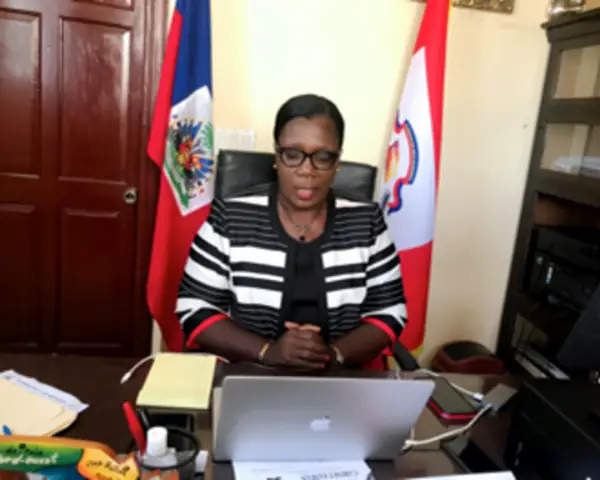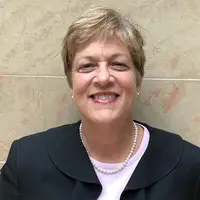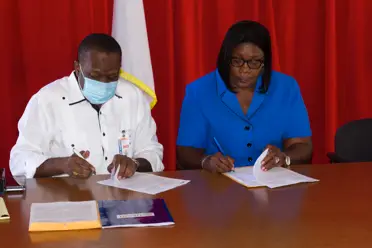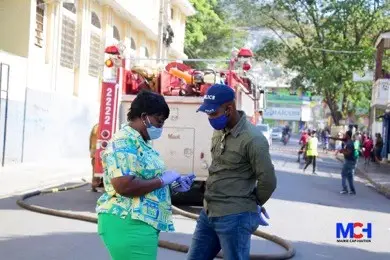This blog was written by Marie Nadine Gaston, Communications Consultant for USAID’s Project Supporting the Efficient Management of State Resources (GERÉ), implemented by RTI. GERÉ provides technical support to local authorities, including the town hall in Cap-Haïtien, to ultimately help improve their capacity to deliver services to the public.
Being a woman in politics in Haiti is no easy feat. In an arena historically dominated by men, breaking the proverbial ceiling is something that many women in Haiti might aspire to, but very few achieve. But Yvrose Pierre is no ordinary woman. She not only broke the glass ceiling; she shattered it. However, her ascent in the world of politics in her beloved hometown is not without sacrifice.

For almost five years, Yvrose Pierre has been a formidable force at the town hall of the historical city of Cap-Haïtien, Haiti’s second largest city, located in the North Department of the island nation. In 2016, Ms. Pierre was part of a three-member cartel that was elected to lead the town hall. Women have historically been marginalized by men in general, and in politics in particular. Women's associations have long fought to obtain the presence of at least one woman in each cartel running in municipal elections in Haiti’s 146 communes. Being part of two women’s associations gave Ms. Pierre the platform she needed to secure a seat on one of the cartels.
There were 41 cartels running in the municipal elections in Cap-Haïtien at that time,” she recalled. “Our cartel won. I saw this as a sign from God that I was where I was supposed to be.”
As deputy mayor of the commune, Yvrose Pierre rolled up her sleeves and went to work. As in many communes in Haiti, there were many challenges in Cap-Haïtien: overcrowding, congestion in public markets, pollution, insecurity, corruption, and ineffective public services, just to name a few, as well as insufficient resources to meet the commune’s needs. Despite the obstacles, she tackled each challenge with resolve. Her hard work was noticed. On July 17, 2020, her community gave her a big vote of confidence, and the 48-year-old mother of four became the first elected woman mayor of Cap-Haïtien.
“It is an extraordinary experience to see this woman with a will to do everything, a will to succeed,” remarked Nelson Deshommes, former assistant to the town hall’s director of communications and mayor who is now the town hall’s communications manager. “I have worked with Mayor Pierre for four years. She has the capacity to speak and make herself understood by the people. She lays out her plans clearly. She is not a typical politician; she is sincere. She doesn’t go back on her word.”
On her vision for Cap-Haïtien
“I love my city; I love my country. That is why I went into politics,” explained Mayor Pierre. “My goal is to contribute to the reconstruction of my city, which is so full of history and charm.”
One of her greatest accomplishments since becoming mayor is having dealt with public safety issues directly and without hesitation. She ordered the demolition of the Shada area, a stronghold for thieves and gangs where many victims were executed. She cleaned up Place Toussaint Louverture, which was full of trash and was known as an unsafe location. A town hall employee was murdered there in 2018 while doing his job. But this success comes at a high cost. She and her family have received death threats from gangs, and her security team has limited her movements. “But things still have to be done,” she insisted.
In terms of her vision for her hometown, Mayor Pierre says she has the desire to improve things in her commune but does not have the economic power to bring about those changes because all collected taxes must go to Port-au-Prince. “We have many projects for the city. We would love to repair Pont Hyppolite and Pont Neuf [two important bridges in Cap-Haïtien] and build a highway to decongest the city. We want to build two public markets and two bus stations in collaboration with other communes. Green spaces would be created. We would clean up our beaches and remove trash polluting the sea. We want to build a new city that will have all the beauty that Cap-Haïtien is known for. But the resources are just not there,” Ms. Pierre stated.
“This is where the GERÉ project can really help the commune—with fiscal mobilization,” stated Mayor Pierre. On December 17, 2021, GERÉ signed a memorandum of understanding (MOU) with the commune of Cap-Haïtien to formalize the collaboration between the project and the local government. With this MOU, GERÉ will help build the town hall’s capacity to better manage and mobilize resources within the commune, build its personnel’s technical capacity in internal control/audit processes, and help the government to offer quality services to the citizens. The collaboration will help the town hall establish partnerships with central government, financial and technical partners, and other communes, and improve civic engagement to bring about needed changes.
On coping with COVID-19
One of the challenges as mayor of a city is keeping its citizens safe, not just from violence but also from disease. COVID-19 has been and continues to be a major challenge. City officials knew what types of negative impacts were possible because they saw the virus assault other countries. “This motivated the city council to prepare to take action quickly and mitigate damages once the virus entered our communities,” explained Mayor Pierre.
Under the leadership of the mayor's office, the city council hastened to remedy overcrowding in the public markets and undertook a major street cleaning program. Masks and hand sanitizers were distributed, and many wash stations were set up throughout the community. The town hall also launched an awareness-raising campaign, but because there were not a great number of cases, people were not convinced that the virus existed and ignored the prescribed safety measures.
“It hurt to see people not believe,” said Ms. Pierre. “Perhaps they did so by ignorance, or perhaps they needed to keep going out there to earn a living to feed their families.” Nevertheless, the city council continues to mobilize and educate people on the dangers of the coronavirus.
On empowering other women
A feminist (“though, not an extremist,” she smiled), Ms. Pierre is a strong advocate of empowering women and young girls. She founded two women’s associations, the Northern Coalition of Women’s Organizations (REOFEN) and the Haiti Association of Women in Action (AFAD). She founded REOFEN after the January 2010 earthquake to aid displaced individuals and families who had left the devastated Port-au-Prince area and sought refuge in Cap-Haïtien. Her associations have since organized many activities that support women and young people in need, including offering training to women retailers (“les marchandes”) to help them better manage their small business loans. According to Ms. Pierre, there is value in helping women, especially young ones.
I think it is important to educate young girls so that they can assert themselves, direct their lives, and become useful to their country in the future,” said Mayor Pierre.
“This country is going through a crisis; we have lost many of the values that make us proud and dignified individuals. Women have the power to change that. There are more of us [women] than men in Haiti; it is up to us to bring about that change in the way we educate our children at home and in our schools [civic education] so that we may regain all that we have lost.”
On the role of women in politics
Yvrose Pierre has had strong female role models to look up to, starting with her own mother, Yvonne Pierre-Louis. An illiterate woman, Ms. Pierre-Louis raised seven children on her own with earnings as a small retailer.
My mother always said that we have to leave our mark where we live. We have to serve our society, our country, our community. And that is what has motivated me to always try to make a difference,” explained Ms. Pierre.
Women have always distinguished themselves in Haiti’s history. Ms. Pierre cites Sanité Bélair and Dédée Bazile, known as Défilée la Folle, as two of her favorite heroines. Sanité Bélair was a lieutenant in the Haitian army and led her troops against Napoleon’s ferocious French Army led by the infamous General Rochambeau during the Battle of Vertières, which eventually won Haiti its independence. Dédée Bazile was brave enough to recover Emperor Dessalines’s body after he was murdered by his former comrades (with his body then stoned and mutilated by the crowds) and bury him. This was very risky in the political climate of the times. “They were both extremely courageous women in adverse environments who did not back down in the face of danger. I aspire to be like them every day.”
But there are many challenges for women in politics in Haiti. Most of them are reluctant to run for public office because they are afraid of being a target of both media damage and actual physical harm. Furthermore, men usually do not wish for their wives to go into politics for many reasons—and may at times forbid it. The main reason cited is that women are needed at home to manage the house and the children. And perhaps a more pernicious fact, according to Ms. Pierre, is that women are often the victims of sexual harassment by men if they are allowed to participate in politics. For these many reasons, during the 2016 elections, only 3 out of the 19 communes of the North Department had women as head of their cartel: Acul-du-Nord, Borgne, and Dondon.
“This is disappointing because women are capable of so much more,” stated Mayor Pierre. “I tell my own girls, ‘True beauty lies in your intelligence, in the knowledge that you procure; we, as women, must educate ourselves.’”
Women bring about great change. “Take Ertha Pascal-Trouillot, for example,” Ms. Pierre pointed out. “She was able to organize Haiti’s first free democratic elections. We have not seen that quality of elections since then.” Supreme Court Justice Trouillot became Haiti’s first woman president from 1990 to 1991 and managed Haiti’s transition from a dictatorship to a nascent democracy.
When asked if she aspired to climb higher in politics, Mayor Pierre had this to say: “I could probably run for legislative elections, and maybe win. But I choose not to because it would take me away from my city. Here, in my community, side by side with my people, I can make a bigger difference.”



